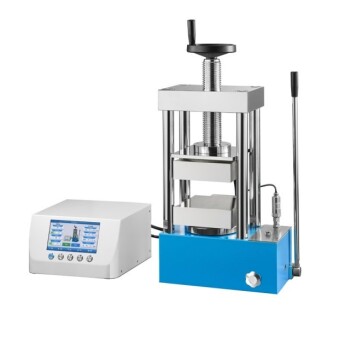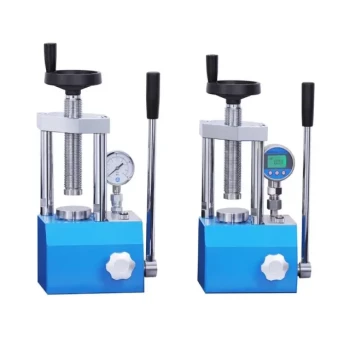The fundamental advantage of a hydraulic press is its ability to generate an exceptionally large amount of force from a very simple design, all while maintaining precise control. This unique combination of power, precision, and versatility makes it an indispensable tool across a vast range of laboratory and industrial applications, from sample preparation to heavy manufacturing.
The true value of a hydraulic press is not just its raw power, but its capacity for highly repeatable and controllable force. This ensures consistent, high-quality outcomes, whether you are creating a sensitive lab sample or mass-producing an industrial part.

The Core Principle: Unmatched Force Amplification
At the heart of every hydraulic press is a simple principle that delivers immense power. Understanding this is key to appreciating its other benefits.
How It Delivers Massive Power
A hydraulic press operates on Pascal's Law, which states that pressure applied to an enclosed fluid is transmitted undiminished throughout the fluid. By applying a small force to a small piston, the system generates a proportionally massive force on a larger piston.
This force multiplication means that minimal input effort, often from a simple hand pump or a small electric motor, can produce many tons of output force.
Full Power at Any Point
Unlike a mechanical press that only delivers maximum force at the very bottom of its stroke, a hydraulic press can deliver its full rated force at any point in the ram's travel. It can also hold that pressure for an extended period without consuming additional energy.
Precision and Repeatability: The Keys to Quality
While raw power is impressive, it's the control over that power that makes a hydraulic press so effective.
Consistent and Controllable Pressure
Most hydraulic presses are equipped with a pressure gauge. This allows an operator to apply a precise amount of force and, more importantly, to apply that exact same force again and again.
This is critical for applications like creating KBr pellets for FTIR spectroscopy, where consistent sample density is necessary for reliable analysis.
Repeatable Results, Every Time
The ability to dial in and repeat a specific pressure ensures uniformity from one task to the next. This repeatability reduces material waste, minimizes failed parts, and increases overall efficiency in both research and production environments.
Unlocking Versatility for Diverse Applications
The simple and scalable nature of hydraulics allows for a wide array of press designs tailored to specific needs.
From Lab Benches to Factory Floors
The same core principle is used in small, benchtop laboratory presses and in massive industrial machines used for forming, molding, and stamping metal parts. This scalability makes the technology incredibly versatile.
The Power of Heat: The Hydraulic Hot Press
For applications involving polymers, composites, or laminates, a hydraulic hot press is used. These machines combine high pressure with precisely controlled heating platens.
This simultaneous application of heat and pressure ensures consistent temperature distribution and bonding, improving the quality of the final product and reducing processing time.
Compact Power: The Hydraulic Mini Press
For laboratories with limited space, the hydraulic mini press offers a solution. These small, portable units are lightweight but can still generate significant force (e.g., 2 tons), making them ideal for tasks in pharmaceutical or polymer testing labs.
Understanding the Trade-offs and Practical Benefits
To make an informed decision, you must also consider the practical realities and limitations of the technology.
Cost-Effectiveness and Maintenance
Hydraulic presses have fewer moving parts compared to their mechanical counterparts. This simple design leads to high reliability and minimal maintenance requirements, contributing to a lower total cost of ownership over the machine's life.
Inherent Safety Features
Hydraulic systems have built-in overload protection. The pressure in the system can only reach the level set by its relief valve, making it impossible to apply a force that would damage the machine or create an unsafe condition.
Potential for Slower Cycle Times
One potential trade-off is speed. The movement of hydraulic fluid can result in slower ram speeds compared to some high-speed mechanical presses. For applications demanding extremely high cycle rates, a mechanical press might be more suitable.
Making the Right Choice for Your Application
The "best" advantage depends entirely on your specific goal.
- If your primary focus is consistent sample preparation (e.g., for spectroscopy): The key advantage is precise, repeatable pressure control, which guarantees reliable test conditions.
- If your primary focus is material molding (e.g., polymers or composites): A hydraulic hot press is essential, as its combination of controlled heat and pressure is the main benefit.
- If your primary focus is general workshop forming on a budget: The simple design, high force-to-footprint ratio, and low maintenance requirements make it a cost-effective choice.
- If your primary focus is portability in a small lab: A mini hydraulic press provides significant force in a compact, lightweight package that other technologies cannot match.
Ultimately, a hydraulic press provides a powerful, controllable, and reliable solution for any task that demands the precise application of force.
Summary Table:
| Advantage | Key Feature | Benefit |
|---|---|---|
| High Force | Force amplification via Pascal's Law | Generates tons of force from minimal input |
| Precision | Controllable pressure with gauges | Ensures consistent, repeatable results |
| Versatility | Scalable designs (e.g., hot press, mini press) | Adapts to various applications like sample prep and molding |
| Safety | Built-in overload protection | Prevents damage and unsafe conditions |
| Cost-Effectiveness | Simple design, low maintenance | Reduces total cost of ownership |
Ready to enhance your lab's efficiency with reliable hydraulic press machines? KINTEK specializes in automatic lab presses, isostatic presses, heated lab presses, and more, delivering precise force control and versatility for your laboratory needs. Contact us today to discuss how our solutions can improve your sample preparation and material testing processes!
Visual Guide

Related Products
- Automatic Laboratory Hydraulic Press Lab Pellet Press Machine
- Laboratory Hydraulic Press 2T Lab Pellet Press for KBR FTIR
- Laboratory Hydraulic Press Lab Pellet Press Button Battery Press
- Manual Heated Hydraulic Lab Press with Integrated Hot Plates Hydraulic Press Machine
- 24T 30T 60T Heated Hydraulic Lab Press Machine with Hot Plates for Laboratory
People Also Ask
- How are hydraulic presses used in the preparation of powder mixtures? Achieve Precise Compaction for Accurate Analysis
- How do hydraulic press machines ensure precision and consistency in pressure application? Achieve Reliable Force Control for Your Lab
- How are hydraulic pellet presses used in educational and industrial settings? Boost Efficiency in Labs and Workshops
- How do hydraulic pellet presses contribute to material testing and research? Unlock Precision in Sample Prep and Simulation
- What are the limitations of hand-operated presses? Avoid Sample Compromise in Your Lab



















